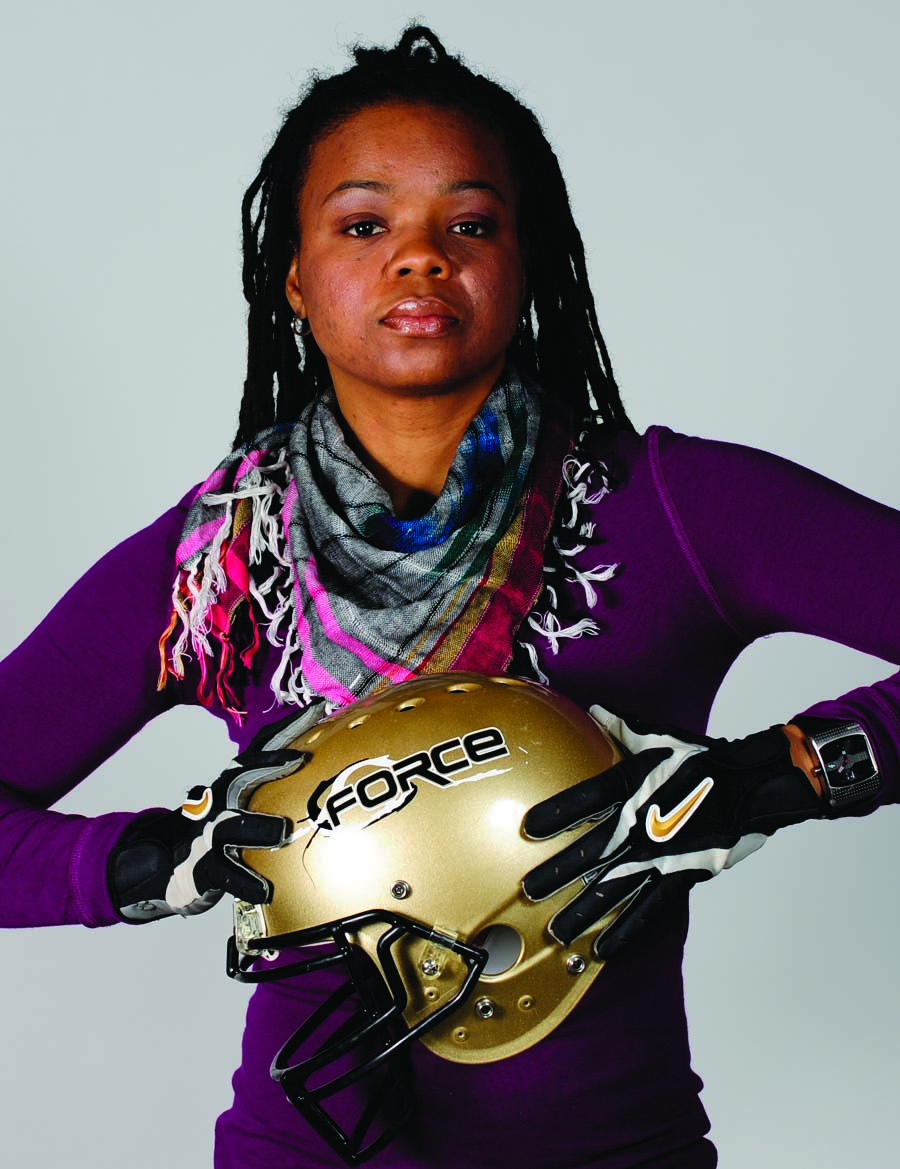Brooke Coley ’03, chemical engineering, remembers it as a dream play for a football defense. Two defenders burst through the offensive line just moments after the snap, trapping the quarterback in the backfield. One defender tackles the quarterback, allowing the second defender to zero in on the ball and yank it loose.
As the football falls from the quarterback’s hands to the turf, the second defender alertly scoops up the ball and scampers all the way down the field for a 41-yard touchdown. Coley was the second defender on the play, and the touchdown she scored were the first points ever tallied by the Pittsburgh Force: a women’s football team that began playing last year.

She still smiles broadly when she talks about the play. “I go in the history books for our team. For the first TD to be a defensive TD; I wasn’t expecting that at all,” says Coley. “It was cool. It was a really good feeling.”
Coley is a Tidewater, VA native who played four sports in high school. But as a member of the tenth class of Meyerhoff Scholars at UMBC (M10), Coley decided to limit her pursuit of athletic glory as she pursued a bachelor’s degree in chemical engineering.
After graduation, Coley began working toward a Ph.D. in bioengineering at the University of Pittsburgh. She expects to receive her degree this spring.
But Coley heard the call of athletics – and the gridiron, in particular – as she sprinted for a doctorate. It began one night while she was playing pickup basketball one night, when she received an offer to try out for the Pittsburgh Passion, a team that was playing in a women’s football league. While Coley had played some rugby while she was at UMBC, she had never really considered playing football.
Coley made the team and quickly fell in love with the game. She joined the Pittsburgh Passion as a safety and linebacker in 2006. Coley played with the Passion for three seasons until moving to a new expansion team in the women’s league – the Pittsburgh Force – this past spring.
“I’m an aggressive person, but I’m always thinking, always calculating,” says Coley. “One thing that was hard for me for football was that our coaches tend to want us to be animated, and they want us to growl. They’ll say, ‘You girls aren’t mad enough, aren’t angry.’ If a player comes my way, I’m going to get her, but I don’t have to growl at her or anything like that.”
Coley prefers to let her play do all the talking. Another one of her favorite plays came when she had to cover a wide receiver who was talking trash at the line of scrimmage. Coley gave no verbal response, but instead flattened her talkative opponent when she tried to catch a pass only moments later. As the player lay stunned on the ground, Coley quietly reached down and helped her up.
“She didn’t say another thing the whole game,” recalls Coley with a smile.
Coley isn’t sure what the future holds for her professionally, but she professes that she’d love to return to UMBC – which she says is “like a second home to me” – as a teacher and researcher with Dr. Timmie Topoleski, who was a mentor during her undergraduate years.
Coley picked UMBC and the Meyerhoff program over Duke after receiving acceptance letters to the schools only one day apart. Coley said her trip to UMBC during the Meyerhoff selection process quickly sold her on the school, even though she had spent lots of time talking with her family about her love for Duke.
Though Coley is now busy crunching data and finishing her doctoral thesis, she says she will continue playing football this spring. She views the three-hour practices that the Force holds three times a week during the season as great outlets for relieving academic stress and staying in shape.
“Football used to be a game I watched on TV,” Coley said. “I watch the game differently now. Now I know what it means to be a player.”
Tags: Winter 2010
